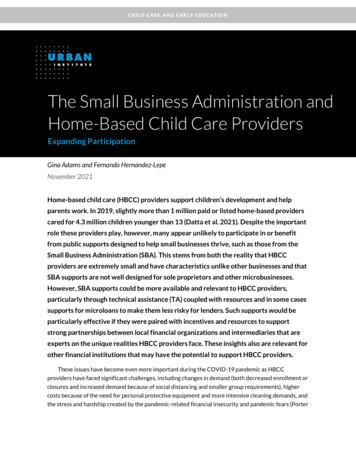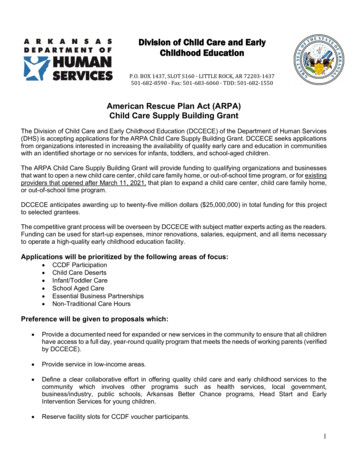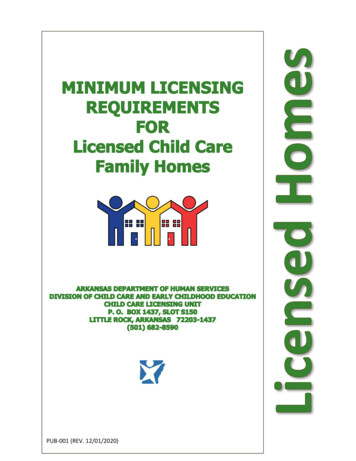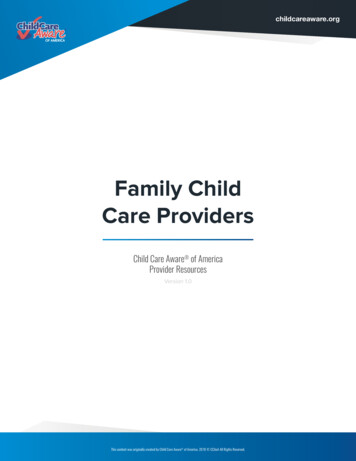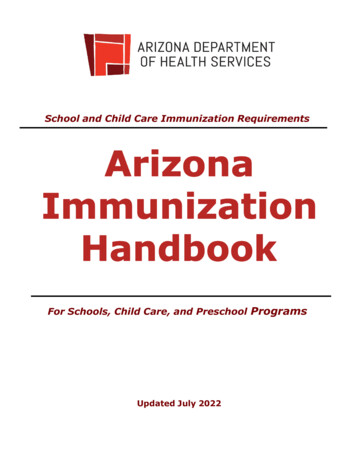
Transcription
School and Child Care Immunization RequirementsFor Schools, Child Care, and Preschool ProgramsUpdated July 2022
IntroductionThe Arizona Department of Health Services (ADHS) and the Arizona Immunization Program Office(AIPO) appreciate the time and effort the staff of schools and child care centers invest in verifyingthat all enrolled children are appropriately immunized and for submitting the annualImmunization Data Report (IDR) to ADHS/AIPO.The Arizona Immunization Handbook for School and Child Care Programs (Handbook) is areference guide for school and child care staff who review and document student immunizationrecords, complete the IDR, and answer questions from parents and guardians about schoolimmunization requirements for children. School, preschool and child care staff deal withimmunizations every day and are expected to know a lot about them. This Handbook will helpyou.The Handbook reviews school immunization requirements, staff responsibilities, procedures forevaluating immunization requirements, and reporting obligations. The Handbook can be found onthe AIPO Child Care, School & College webpage and is supplemented by the Guides forImmunization Requirements (Child Care & K-12) and our new Vaccine Catch-up Flowcharts &FAQs resource. Additional job aids and various forms needed to complete immunization activitiesin the health office can also be found on the website.Updates to immunization requirements and forms are posted on the AIPO website prior to thestart of each school year, or with any significant changes. Please check the website for updatedmaterials. While you may want to print the manual and place it in a three-ring binder, we suggestyou access it electronically so that you get the latest versions of the information, forms, and jobaids.For any questions or comments, please call or contact:Arizona Department of Health ServicesImmunization Program Office150 North 18th Avenue, Suite 260Phoenix, AZ 85007-3233Phone: 602-364-3630Fax: 602-364-3285July 2022Arizona Immunization Handbook for School and Child Care Immunization RequirementsPage 2
Table of ContentsResponsibilities . 4Vaccine Requirements . 74 Day Grace Period for Vaccine Doses Administered . 9Requirements for Special Student Categories . 11— Alternative or Online Schools . 11Immunization Status . 15Exemption Forms . 17Immunization Records . 20Required Annual Immunization Reporting . 24ASIIS - State Immunization Registry . 25Review, Follow-up and Referral Procedures. 26Disease Reporting Requirements . 29Vaccine-preventable Diseases, Descriptions . 30Common Vaccine Names and Abbreviations, Reference . 31County Health Department Contact Information . 33Immunization Information Resources. 34July 2022Arizona Immunization Handbook for School and Child Care Immunization RequirementsPage 3
ResponsibilitiesTo protect all children against serious vaccine preventable diseases, Arizona school immunizationlaws require students to receive immunizations before entry to child care and school. The lawsand rules governing school immunization requirements are Arizona Revised Statutes §15-871874; and Arizona Administrative Code, R9-6-701–708. Many organizations and individuals haveresponsibilities for assuring children and students in Arizona are immunized. See below forspecific responsibilities.Parents/Guardians:The definition of a “parent” is “the natural or adoptive mother or father, a legal guardianappointed by a court, or a “custodian” as defined in A.R.S. 8-201. A parent is a person generallyrecognized as having care and decision-making responsibility for the child. Parents, includingfoster parents, have the responsibility to ensure their child is meeting Arizona schoolimmunization requirements. Parents should keep accurate and up-to-date immunization recordsfor their children. Parents are to submit an up-to-date immunization record or a valid ADHSexemption form to their child’s school, preschool, or child care before the child can attend.Healthcare Providers:A physician is defined as a person licensed under A.R.S. 32, Chapter 13 or, Chapter 17, orChapter 29. This definition also applies to persons licensed to practice allopathic (MD) orosteopathic (DO) medicine under the laws of another state or country. Per A.R.S. 15-871, thefollowing licensed healthcare providers can administer vaccines in Arizona: Medical Doctors (MD) Chapter 13Doctors of Osteopathy (DO) Chapter 17Homeopathic Physicians (MD, DO, or MD(H)) Chapter 29Nurse Practitioners (ARNP) with prescriptive authority, Chapter 15Pharmacists, Chapter 18Healthcare providers are encouraged to immunize patients according to the most current Centersfor Disease Control (CDC) Advisory Committee on Immunization Practices (ACIP) recommendedimmunization schedules. Healthcare providers are to follow education and documentationrequirements as stated in A.A.C. R9-6-703.The HIPAA Privacy Rule permits providers to disclose proof of required immunizations to a schoolwith agreement of the parent or guardian. The agreement may be obtained orally or in writing,and need not be signed or contain the other elements required in a formal, written HIPAAauthorization. More information about the HIPAA Privacy rule as it relates to studentimmunizations can be found at: udent-immunizations/index.htmlSchool, Preschool, and Child Care Staff:A school is defined as a public, private, charter, or parochial school that offers instruction at anygrade or level through grade 12, or any part thereof. The term school does not apply to daycare/child care facilities regulated pursuant to Chapter 7.1.July 2022Arizona Immunization Handbook for School and Child Care Immunization RequirementsPage 4
A Child Care Facility is defined as a licensed child care center, certified child care group home,Head Start or preschool; a program caring for children that is licensed or certified by the ADHSChild Care Facilities Licensing Division.An administrator is defined as the individual or the individual’s designee having daily control andsupervision of a school or child care facility. This is the person responsible for generalenforcement of the law and rules, including exclusions, and submission of the annualImmunization Data Report for the required grades.Administrators in these facilities have final responsibility when it comes to immunizationcompliance. It is the responsibility of the school administrator or child care administrator (or theirdesignee) to ensure that an immunization record- or a valid ADHS exemption form- is maintainedfor each child enrolled at the school or child care center. The law requires child care facilities andschools to enforce immunization requirements, maintain immunization records of all childrenenrolled, and submit reports to public health agencies.It is the duty of the administrator, by law, A.A.C. R9-6-705, to exclude children from school,preschool, or child care if they do not meet immunization requirements. Exclude or exclusionmeans not allowing a student to attend a school or child care facility based on lack of receipt ofan up-to-date immunization record or valid ADHS exemption form.Administrators may designate other staff to do immunization compliance tasks, such as nurses,health assistants, administrative personnel, or other school staff. Schools, preschools and childcares should have and follow policies to protect confidential information such as immunizationrecords.The first key to success is being very clear with parents or guardians that you must enforce theArizona law and the basic rule of, “No shots? No school!”. The ADHS “It’s The Law” poster isdual-sided in English and Spanish and can be ordered through the AIPO website.The following immunization compliance tasks are the responsibility of schools, preschools, andchild cares: Ensure documentary proof of immunization as specified in R9-6-704 (A), Table 7.1 andTable 7.2 Ensure documentary proof of immunity as specified in R9-6-706 (D) Develop a manual tracking system or use a software system to collect studentimmunization information Identify students who are missing required immunizations and contact parents for referraland follow-upJuly 2022Arizona Immunization Handbook for School and Child Care Immunization RequirementsPage 5
Exclude children who do not meet the immunization requirementsIdentify and keep a list of susceptible students (students with an exemption or missingdoses) to use in the event of a disease outbreakTeach staff and parents about the importance of immunizations, in accordance with scopeof practice, andFollow state immunization laws and school requirements.County/Local Health Departments:County health departments (aka local health departments) administer immunizations as well asprovide materials about communicable disease and immunization rules. Public health officialshave the responsibility to work with schools, preschools, and child cares to prevent and controloutbreaks of diseases that vaccines can prevent. They also work with local healthcare providers toimprove immunization levels in their communities. In the event of a disease outbreak, the CountyHealth Department Health Officer or Medical Director or state health department personnel havethe authority to exclude children from school, preschool or child care.Arizona Department of Health Services:The Immunization Program Office (AIPO) at the Arizona Department of Health Services (ADHS)tracks immunization levels in the state as part of a federal requirement. Clinical staff are availableto answer questions about the immunization requirements, and are a resource about vaccines andvaccine-preventable diseases. The office has the responsibility to develop the guidance and formsfor use at schools, preschool and child care facilities, which can be found on the program website.Public health staff may review school, preschool, and child care facility immunization records toensure they comply with state regulations. The Immunization Program Office works with state,county and local agencies including: Arizona Department of Education (ADE) Arizona Department of Child Safety (DCS) County Health Departments ADHS Child Care Facilities Licensing Division Healthcare providers Health office staff for schools, preschools and child care centersJuly 2022Arizona Immunization Handbook for School and Child Care Immunization RequirementsPage 6
Vaccine RequirementsSchool, preschool, and child care staff can help protect children against serious diseases byencouraging full and timely immunization. Help parents understand that: Each child must have documentary proof of immunization or immunity for the requiredvaccines. Immunizing on time gives children the best protection. Immunization requirements in schools, preschools and child cares have been shown toincrease immunization coverage levels. Communicable diseases still exist and international travel can bring diseases commonin other part of the world to our communities. Keeping up-to-date records at home and school/preschool/child care is important Eligible children can get immunizations at no cost through the Vaccines for Children(VFC) program in Arizona. Providers may charge an administration fee, but they mustwaive the fee if the parent is unable to pay.State Required Versus ACIP Recommended Immunizations:The difference between state immunization requirements and national recommendations can getconfusing. Staff should understand the difference so parents and guardians get the necessaryinformation to their child’s school, preschool, or child care. These definitions can help: Recommendations: The Advisory Committee on Immunization Practices (ACIP)makes national vaccine recommendations that healthcare providers follow as the “bestpractice” to get the best protection from diseases that vaccines prevent. Not all of thevaccines recommended by the ACIP Immunization Schedule are required for school orchild care attendance in Arizona. Requirements: Children are required by Arizona statute A.R.S. 15-872 to submitdocumentary proof of immunization to enter school, preschool, and child care, unlessexempted according to section 15-873.o The Arizona Administrative Code (A.A.C.) or rule R9-6-702 further explains thelaw by determining immunization requirements using the ACIP RecommendedImmunization Schedule along with Arizona-specific vaccine decisions.Schools, preschools, and child care facilities must, at a minimum, obtain documentation of thestate school required vaccines; however, this does not preclude schools from recommending ordocumenting additional vaccines that meet the ACIP recommended vaccination schedule. Eachstate sets its own requirements for school and child care attendance which may differ from whatis required in Arizona. When a student, whether from another state or another country, enrolls inan Arizona school or child care they must adhere to the Arizona state requirements forattendance.Arizona Required Immunizations:According to the Arizona Administrative Code R9-6-702 any child attending school, preschool, orchild care in Arizona is required by law to be fully immunized at the ages and intervals consistentwith the rules for their age (preschool/child care), or grade (K-12th grades) or have proof ofimmunity against the following diseases:July 2022Arizona Immunization Handbook for School and Child Care Immunization RequirementsPage 7
DiphtheriaTetanusPertussisMeasles (rubeola)MumpsRubella (German measles)Hepatitis A (for child 1-5 years of age inchildcare, required for Maricopa County)Hepatitis BPoliomyelitis (Polio)Haemophilus influenza type b, for a child twomonths through 59 months of ageVaricella (chickenpox)Meningococcal diseaseTuberculosis (TB) screening for students is not part of the Arizona school immunization law. If youhave questions regarding TB disease or TB screening requirements, please contact your localhealth department’s TB control program. At ADHS, the Office of Disease Integration and Serviceshouses the Tuberculosis Control Program.Vaccine Requirement Guides and Resources:Arizona vaccine requirements guides and resources are updated for each school year and can befound on the Arizona Immunization Program’s Child Care, School & College webpage. Immunization Requirements for Grades K-12School requirements are listed on the Arizona Guide to Immunizations Required for School Entry:Grades K-12. Authorized school personnel must review each child’s immunization record(s) at thetime of enrollment and/or prior to school attendance. Students attending school must get the required doses listed in the guide to becompliant with immunization requirements. The guide is meant to review the vaccines required at the age when the child isenrolled at a particular school. To find the doses required, look at the column thatinclude the student’s current age, and then the row for the required vaccine. Compare the child’s number of vaccine doses to the requirements, by age, anddetermine if all requirements are met. Check the timing and minimal intervals ofdoses specified. The requirements and rules vary depending on the student’s ageand grade. Complete the Arizona School Immunization Record (ASIR109R) or enter the datainto your school-based vaccination information system.If requirements are not met and the child lacks any required immunization doses, schools are togive the parent/guardian the Immunization Screening and Referral Form for School K-12th Grade.If a review of the student records does not happen until the child is already attending school, thenthe parent/guardian is to be notified using the referral form and indicate a “due by” date on thereferral form. The Department asks schools to review immunizations at enrollment and up untilthe time your facility opens for school and refer those students who still lack the requiredimmunizations, using the Immunization Screening and Referral Forms (for K-12 and Child Care),and providing them with a “due by” date when the vaccines will be needed. A reasonable timeframe is recommended to allow parents to make appointments.Because up-to-date vaccination is critical to preventing disease in our communities theDepartment suggests you work with your school or district officials and/or your legal counsel todetermine if or how long a vaccination extension would be allowed in your district based oncurrent law.July 2022Arizona Immunization Handbook for School and Child Care Immunization RequirementsPage 8
Immunization Requirements for Child Care, Preschool, and HeadStartChild care, preschool and Head Start requirements are shown on the Arizona Guide toImmunizations Required for Entry: Child Care or Preschool. Authorized child care personnel must review each child’s immunization record(s) atthe time of enrollment and/or prior to child care attendance. Students attending child care or preschool must get the required doses listed in theguide to be compliant with immunization requirements. The guide is meant to review the vaccines required at the age when the child isenrolled at a particular child care or preschool. To find the doses required, look atthe column that include the child’s current age, and then the row for the requiredvaccine. Compare the child’s number of vaccine doses to the requirements, by age, anddetermine if all requirements are met. Check the timing of doses to make sureminimum intervals have been met. The requirements and rules vary depending onthe student’s age and grade. Complete the Emergency Immunization and Information Record Card (EIIRC 201).Preschools and child care facilities may also document on the Arizona SchoolImmunization Record (ASIR 109) or a facility-based vaccination informationsystem.If the child lacks immunizations required for child care attendance, child care centers are to givethe parent/guardian the Immunization Screening and Referral Form for Child Care and Preschool.Per child care rules, the child’s parent/guardian has 15 calendar days after child care entry toprovide the child care center with proof of all required immunizations. The child shall be excludedfrom the center if the parent/guardian of the child fails to provide adequate documentation. 4-Day Grace Period for Administered Vaccine DosesThe Advisory Committee on Immunization Practices (ACIP) allows for most vaccine dosesadministered within 4 days of the recommended minimum age or interval to be counted as valid.This is now considered standard practice according to ACIP recommendations as of July 2014.However, the 4-day grace period does not apply in all situations. It does not allow a 4-day graceperiod between doses of varicella, MMR vaccines, or nasal influenza vaccine doses, as these areall live vaccines. Live vaccine doses must be given on the same day or at least 28 days apart.The Arizona Immunization Program Office (AIPO) accepts vaccine doses given within the ACIPapproved grace period as valid for child care and school entry. The 4-day grace period includesthe first MMR, varicella, or hepatitis A dose, which may be counted if it was administered nosooner than 4 days before the child’s first birthday.School/Child Care Staff Immunization Requirements: K-12 SchoolsArizona immunization statutes and rules to not address adult immunization requirements orrequirements for K-12 school staff; however, knowing staff immunization status can prepareschools in advance of a disease outbreak. Decisions for staff vaccine requirements are made bythe school or the school district and should involve the Human Resources departments. You maywish to reference the ACIP Recommended Adult Immunization Schedule or the RecommendedJuly 2022Arizona Immunization Handbook for School and Child Care Immunization RequirementsPage 9
Vaccines for Healthcare Workers if you choose to make vaccine recommendations or requirementsfor your staff.During an outbreak susceptible staff not completely immunized or able to prove immunity may beexcluded from school at the direction of the local Health Officer. Staff should refer to their schoolor district policies whether staff can take sick leave when excluded. Child Care/Preschool/Head StartSpecific requirements for child care staff can be found in the Child Care Facility Rules andStatutes. Rule R9-5-301, General Licensee Responsibilities, Section F: A licensee shall ensure thata staff member submits, on or before the starting date of employment or volunteer services, oneof the following as evidence of freedom from infectious active tuberculosis: 1. Documentation of anegative Mantoux skin test or other tuberculosis screening test recommended by the U.S. Centersfor Disease Control and Prevention, administered within 12 months before the starting date ofemployment or volunteer service, that includes the date and the type of tuberculosis screeningtest; or 2. If the staff member has had a positive Mantoux skin test or other tuberculosisscreening test, a written statement that the staff member is free from infectious activetuberculosis that is signed and dated by a health care provider within six months before thestarting date of employment or volunteer service.'R9-5-301 Section K states: A licensee shall not allow a staff member who lacks proof of immunityagainst a disease listed in R9-6-702(A) to be present in the facility between the start and end ofan outbreak of the disease at the facility.R9-5-402, Staff Records and Reports Section A: A licensee shall maintain a file for each staffmember containing: (5) The staff member’s written statement attesting to current immunityagainst measles, rubella, diphtheria, mumps, and pertussis.Please contact the Child Care Facilities Licensing Division if you have any questions as to staffvaccination requirements.College/University Immunization Requirements:Arizona state law does not address or mandate immunization requirements for colleges anduniversities. These decisions are made by the individual schools and requirements vary. On theAIPO College Information page, you can find links to the health office websites for several Arizonauniversities as well as general recommended immunizations for college students. Students gettingready for college should contact their school to confirm which immunizations might be requiredfor attendance.July 2022Arizona Immunization Handbook for School and Child Care Immunization RequirementsPage 10
Requirements for Special StudentCategoriesAdditional special school populations for which there are responsibilities regarding immunizationsare outlined below:Alternative or Online School Programs:There are a variety of online education opportunities for children in Arizona. We encourage onlineschools to obtain immunization records for all of the students registered in their programs.Students enrolled in online programs who physically attend an Arizona school or facilityfor the purpose of attending an online class, are in a room with other online studentsfor classes, or are participating in classes or activities such as band or physicaleducation, are required to have immunization records on file with the program and/orthe physical school. These students should then be included in the school’s annualImmunization Data Report to the state health department, if in an applicable grade. Programsunable to distinguish between students that are online only and those students that participate incampus program activities with other students must have immunization records for all of thestudents.Some online or virtual schools have a testing period where students are all together in aroom or facility. If this is a process for your school, then collection of immunizationrecords for all students is encouraged.Arizona rules do not address the exclusion of online students who are noncompliant withimmunizations. Online school administrators will need to develop policy as to exclusion,particularly if your online school elects to collect immunization records on all students, regardlessif they are strictly online or physically attend a facility for the online classes.Foster Care Students:The Every Student Succeeds Act (ESSA) states that students in foster care should remain in theirschool of origin. When it is not in the best interest of the student in foster care to remain in theirschool of origin, then that student would need to be immediately enrolled into the new school,even without the ability to produce records normally required for enrollment (i.e. proof ofimmunization, birth certificate, transcripts, etc.). The enrolling school shall immediately contactthe school last attended to obtain relevant academic and other records.School staff may also contact their district or charter liaison for students in foster care forassistance in obtaining needed records (a list of foster care liaisons by district/charter can befound on ADE’s Foster Care page). ARS 15-872 states that while the school is still required toobtain the student’s immunization record and ensure that the student has met all immunizationrequirements, that requirement should not delay the enrollment or attendance of a student infoster care.The Arizona Department of Education (ADE) has interpreted ESSA to supersede regulationsestablished by individual states. Because the ADE is the primary state agency that regulatesschools and they have a great deal of knowledge and expertise in matters concerning federalJuly 2022Arizona Immunization Handbook for School and Child Care Immunization RequirementsPage 11
legislation pertaining to students in foster care, ADHS defers to them concerning the continuedattendance of students in foster care.When ESSA passed in 2015, it amended the definition of homeless in McKinney-Vento. The part ofthe homeless definition that says ‘awaiting foster care placement’ has been REMOVED fromMcKinney Vento. Therefore, children in foster care are NO LONGER identified as ‘homeless’.Children in foster care are their own subgroup within the school system.The Arizona Department of Child Safety (DCS) policy is that foster children must be fullyimmunized unless there is a medical contraindication, which would then require an ADHS MedicalExemption to be completed. If the child is missing immunizations the foster parent must take thechild to a health care provider as soon as medically possible for immunizations according to theACIP catch-up schedule. DCS further states that licensed foster parents cannot impose theirvaccine hesitancy beliefs on foster children and are not authorized to request a school or childcare vaccine exemption for a foster child. See also section on Exemption Forms, Foster ChildGuidance.Contact information for the State Foster Care Education Coordinator is listed below.Joey L. TaylorFoster Care Education CoordinatorPhone: 602-542-3569Email: ss Students:Homeless students are protected by the federal McKinney-Vento Homeless Assistance Act.Families and homeless students are often not able to get and keep copies of immunizationrecords. According to the McKinney-Vento Act, schools must allow homeless students to enroll,attend classes, and participate fully in school activities, even if their immunization and otherschool records are missing or unavailable at the time of enrollment. Once a homeless student isenrolled, school staff should work with the student’s former school to obtain the student’simmunization records quickly.ARS 15-872 states that while the school is still required to obtain a student’s immunization recordand ensure that the student has met all immunization requirements, it also says that students ina homeless situation are not required to provide documentary proof of immunization until the fifthcalendar day after enrollment in school. The Arizona Department of Education (ADE) hasinterpreted the McKinney Vento Act to supersede regulations established by individual states.Because the ADE is the primary state agency that regulates schools and they have a great deal ofknowledge and expertise in matters concerning McKinney-Vento, ADHS defers to them concerningthe continued attendance of homeless students without proof of immunizations. Furtherinformation can be found in the ADE Guidance for Immunizations for Homeless Students.If a child or youth experiencing homelessness needs to obtain immunization or other requiredhealth records, the enrolling school will immediately refer the parent, guardian or unaccompaniedyouth to the local liaison, who will assist in obtaining necessary immunizations or screenings, orimmunization or other required health records [42 U.S.C. § 11432(g)(3)(C)(iii)]. HomelessJuly 2022Arizona Immunization Handbook for School and Child Care Immunization RequirementsPage 12
students should not be excluded from school for being out of compliance with schoolimmunization requirements. Please refer to ADE Office of Homeless Education for additionalinformation.Contact information for the State Homeless Coordinator is listed below.Silvia Chavez, BAState Coordinat
The Arizona Immunization Handbook for School and Child Care Programs (Handbook) is a reference guide for school and child care staff who review and document student immunization records, complete the IDR, and answer questions from parents and guardians about school







